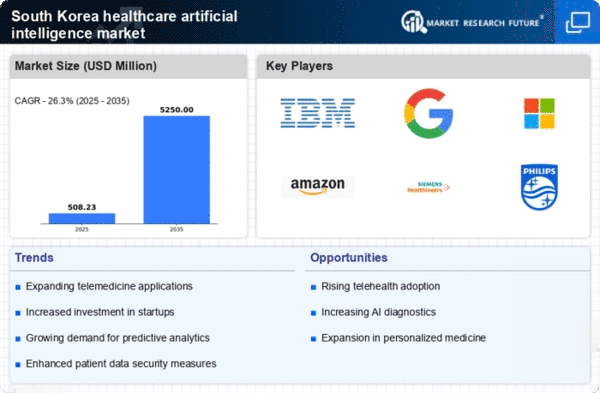Government Initiatives and Funding
Government initiatives in South Korea are significantly bolstering the healthcare artificial-intelligence market. The South Korean government has allocated substantial funding to promote the integration of AI technologies in healthcare settings. This includes investments in research and development, as well as incentives for healthcare providers to adopt AI solutions. For instance, the government aims to increase the utilization of AI in diagnostics and patient management systems, which could lead to a market expansion valued at over $1 billion by 2027. Such initiatives not only enhance the technological landscape but also encourage collaboration between public and private sectors, fostering innovation in the healthcare artificial-intelligence market.
Integration of AI in Medical Imaging
The integration of AI in medical imaging is transforming the healthcare artificial-intelligence market in South Korea. Advanced algorithms are being employed to enhance the accuracy and efficiency of diagnostic imaging processes. This technology aids radiologists in identifying abnormalities and streamlining workflows, thereby improving patient care. The market for AI in medical imaging is projected to reach approximately $500 million by 2026, reflecting a growing reliance on AI solutions in diagnostic practices. This trend not only enhances diagnostic capabilities but also reduces the burden on healthcare professionals, indicating a promising future for AI applications in the healthcare artificial-intelligence market.
Rising Demand for Personalized Medicine
The healthcare artificial-intelligence market in South Korea is experiencing a notable surge in demand for personalized medicine. This trend is driven by the increasing recognition of the need for tailored treatment plans that cater to individual patient profiles. AI technologies facilitate the analysis of vast datasets, enabling healthcare providers to develop customized therapies based on genetic, environmental, and lifestyle factors. As a result, the market is projected to grow at a compound annual growth rate (CAGR) of approximately 25% over the next five years. This growth reflects a broader shift towards precision medicine, where AI plays a crucial role in enhancing patient outcomes and optimizing treatment efficacy.
Increased Focus on Telemedicine Solutions
The rise of telemedicine solutions is significantly impacting the healthcare artificial-intelligence market in South Korea. As healthcare providers increasingly adopt remote consultation services, AI technologies are being integrated to enhance patient interactions and streamline processes. AI-driven chatbots and virtual assistants are being utilized to provide immediate responses to patient inquiries, improving accessibility and efficiency. The telemedicine market is expected to grow by over 30% in the coming years, driven by the demand for convenient healthcare access. This trend highlights the potential of AI to revolutionize patient engagement and service delivery in the healthcare artificial-intelligence market.
Aging Population and Chronic Disease Management
The aging population in South Korea is a critical driver of the healthcare artificial-intelligence market. As the demographic shifts towards an older age group, the prevalence of chronic diseases is expected to rise. AI technologies are increasingly being utilized to manage these conditions effectively, offering predictive analytics and personalized care solutions. The market is likely to see a significant increase in demand for AI-driven tools that assist in monitoring and managing chronic illnesses, potentially leading to a market growth of around 20% annually. This trend underscores the importance of AI in enhancing the quality of care for an aging population.
























Leave a Comment